
These 5 Antiviral Teas, Tinctures and Oils Can Help Protect Your Immune System
You may be surprised to learn that some of the herbal teas, tinctures, and oils you have on hand have antiviral properties. There are a few things to look for when buying items that contain these essences. When purchasing your teas or herbal drops, buy organic for the best possible protection against viruses. Organic foods are up to 40 percent more nutritious than their conventionally grown counterparts and herbs are no exception; organic herbs will contain more active nutrients and compounds than conventional herbs.
Right now, during the time of COVID-19 when your immune system is working overtime, you don’t want to introduce any pesticides, fungicides, or insecticides into your mouth or digestive system and further tax your immune system during this trying time. If you choose to take your herbs in tincture form, look for alcohol-free solvents to further safeguard your immune system. Here are five of our favorite antiviral essences that are available in teas, tinctures, and oils to safeguard your health now and every day. By the way, a tincture is a concentrated liquid medicine or herbal supplement that you can take via dropper on your tongue, and you only need a drop or two to get the benefit.
1. Chamomile Tea
This bedtime staple has many more uses than merely inducing sleep. Chamomile gets its name from two Greek words, khamai, which means “on the ground,” and melon, meaning “apple.” Hippocrates prescribed it as a dilator, to reduce inflammation and swelling, as a diuretic, as an emmenagogue, as a relaxant, as a brain tonic, and even as a cough suppressant. Modern science corroborates Hippocrates’ logic; a 2016 peer-reviewed study found chamomile to have antimicrobial properties, which means chamomile has a deleterious on parasites, bacteria, and viruses. Scientists theorize the compounds that contribute to chamomile’s antimicrobial effects include alpha-bisabolol, luteolin, quercetin, and apigenin.
2. Pau d’Arco Tincture
Maybe you haven’t heard of Pau d’Arco, but indigenous tribes of the Amazon rainforest have used this herb for centuries, as far back as Incan society. The pau d’arco tree is a flowering canopy tree that can grow as tall as 125 feet. Many Amazon tribes use the wood from this tree to craft bows. The University of Colorado states that pau d’arco has demonstrated antiviral qualities against Herpes I & II, influenza, poliovirus, vesicular stomatitis virus, and even interferes with the replication of HIV-1. When brewed as a tea, pau d’arco has a lovely floral taste almost reminiscent of vanilla.
3. St. John’s Wort Tea
Some of our earliest records of the medicinal tradition of St. John’s wort date back to the first century AD to the Roman military doctor Proscurides. The perennial herb native to Europe comes into full bloom around June 24th, the birthday of John the Baptist. St. John’s wort is strongly associated with its ability to treat mild depression, though it can also alleviate premenstrual syndrome, eczema, SAD or Seasonal Affective Disorder, and obsessive-compulsive disorder. The herb has demonstrated efficacy against a host of viruses including methicillin-resistant and penicillin-resistant staphylococcus aureus, Friend virus, Rauscher leukemia virus, and more.
4. Korean Red Ginseng Tea
To receive the most of the benefits of Siberian ginseng, look for an alcohol-free tincture rather than the raw herb. The traditional process of repeatedly steaming and air-drying fresh ginseng chemically alters the constituents of the herb so that the medicine is more bioavailable. Indigenous to shady mountainsides in Korea, Russia, and China, the herbal traditions of these countries have long utilized this adaptogen to improve stamina, memory, and overall health. Korean red ginseng has proven to be effective against hepatitis, respiratory tract infections, influenza, and more.
5. Oregano Oil
A favorite herb of chefs across the world, the essential oil of oregano is surprisingly potent. You might be able to smell a single drop of oregano oil in a carrier oil like coconut oil or castor oil (both of these also demonstrate antiviral properties) applied to a cut or abrasion on your skin all day. In recent years, herbalists and scientists alike have rallied behind the antiviral properties of oregano’s essential oil. Because essential oils are so concentrated, when taking them internally one should use no more than a drop or two dissolved in a full glass of water.
More From The Beet






